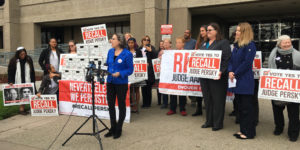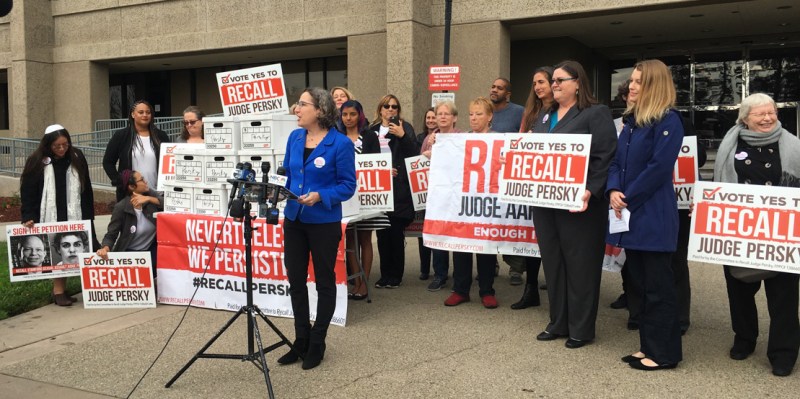The petition to recall Judge Aaron Persky ’84 M.A. ’85, the presiding judge in the sexual assault case against former Stanford student Brock Turner, reached nearly 100,000 signatures Thursday. This exceeded the 58,634 valid signatures needed to qualify for the June 5 ballot.

Persky, a Santa Clara County Superior Court judge, sentenced Turner to six months in county jail in June 2016 based on a recommendation from the Probation department, only for Turner to be released after three months for good behavior. The petition comes as part of a campaign to to recall Persky through the June ballot for what critics describe as an overly lenient sentence.
As chair of the Persky Recall Campaign, Frederick I. Richman Professor of Law Michele Dauber spent the past four months collecting signatures with over 200 volunteers from Stanford to Gilroy, reaching 94,518 signatures in total.
“This is a great first step in this campaign; to bring the signatures in really means nearly 100,000 voters are saying it loud and clear that they are holding Judge Persky accountable,” Dauber said. “In cases of sex crimes and violence against women and marginalized communities, they’ve lost confidence in his ability to fairly adjudicate.”
Turner appealed his conviction in December 2017, seeking a retrial and the removal of his name from the sex offender list after serving three months in county jail for the sexual assault of an unconscious woman outside a Kappa Alpha party in 2015. Turner claimed he did not receive a fair trial in his 172-page appeal.
At the time of the trial, Persky noted prison would have a “severe impact” on Turner. Turner was ultimately convicted of three felony accounts of sexual assault: assault with intent to commit rape of an intoxicated or unconscious person, sexual penetration of an intoxicated person and sexual penetration of an unconscious person.
Prosecutors argued that Turner should spend six years in state prison for the crime. The controversial ruling as well as the publication of the letter written by the victim, referred to as Emily Doe, gained national attention and support for the recall.
“Emily did not get justice — neither did any of the other victims in which Judge Persky also exhibited bias,” Dauber said.
Since the recall effort began, Persky has attempted to halt the petition. According to an article published by SFGate, his attorneys succeeded in preventing the collection of signatures for 12 days in August 2017, arguing that as a state official, the procedure for removing him should be overseen by the Secretary of State, not the county registrar.
The campaign to recall Persky has also met with opposition from members of the public and law professors, including faculty at Stanford Law School (SLS).The Retain Judge Persky campaign, Voices Against Recall, has said that Persky’s recall would compromise the judicial independence and that Persky’s ruling complies with the Probation department recommendation.
In June 2017, 53 SLS graduates also presented an open letter to Dauber opposing the recall effort, while 95 California law professors signed a letter published Aug. 17 urging readers against signing the petition. Thirty of these signatories were professors at Stanford.
“A fair and equitable justice system requires judges who dispassionately assess the culpability and background of offenders, without fear of public opinion, balancing the goals of retribution, deterrence and rehabilitation,” the letter reads. “The recall campaign risks allowing public clamor to distort these crucial acts of judgment.”
The letter stated that the last three elected District Attorneys of Santa Clara County are against the recall and argued that recall movements make judges start “ratcheting up sentences” in fear of media campaigns.
In a September 2017 interview with The Daily, law professor Robert Weisberg J.D. ’79 added that many Stanford Law professors publicly opposed the recall campaign partly because they sought to separate the effort from the University.
“There is a fair amount of distress that the recall campaign and things said by the recall campaign were imputed to [Stanford] Law School,” said Weisberg, Edwin E. Huddleson, Jr. Professor at SLS and a signatory of the second letter. “If more Stanford law professors opposed the recall than favored it … that should help disabuse the public of the notion that [the recall campaign] is Stanford Law School’s position.”
The letter from SLS alumni clarified that their doubts about the recall campaign did not translate into unqualified support for Turner’s sentence.
“To be clear, our hesitation about a recall campaign does not stem from a belief that Judge Persky’s decision to give Turner a below-guidelines sentence was correct or that his stated justifications for doing so were sound,” drafters wrote. “Many of us, like you, believe that justice called for a stiffer sentence in his case. But we think humility requires us to recognize that we won’t always be able to distinguish between legitimate and illegitimate exercises of judicial mercy.”
However, Dauber said the implications of not going through with the recall are more dangerous for victims of assault as reporting of sexual assault on campuses is already extremely low.
“If survivors of sexual assault believe they are not going to be treated fairly, they are much less likely to report,” Dauber explained. “Especially when judges are issuing all of these biased rulings.”
Dauber added that although the Turner case brought Persky into the limelight, he has a history of gender- and minority-biased rulings in favor of privileged communities, such as white college males. Dauber cited four cases in the 17-month period Persky served as a judge in the criminal court, which she said demonstrated his tendency to issue lenient rulings to white men and college athletes who had either raped, sexually assaulted or possessed pornographic photos of children.
“There’s a long history of bias, and the lawyers for the victim in that case as well as others indicated that Persky is biased,” Dauber said, referring to a 2011 De Anza gang rape civil case he presided over. “He does not understand sexual assault or violence against women, and he doesn’t take it seriously.”
Weisberg, one of the 30 SLS signatories on the Aug. 17 letter, disagreed that Persky’s rulings could be proven as an “anomaly” among sexual assault cases in Santa Clara County.
“In the spirit of recall, if a judge makes unpopular decisions, does that make him an outlier?” Weisberg said. “There is hardly an evidence of an atypical ruling in the cases of sexual assault as a baseline. There is no evidence of clear bias on behalf of Judge Persky. The historical understanding of the recall law is that there has to be an anomaly; it has to be extreme.”
Weisberg added that it is difficult to find legal statistics to prove that Persky’s rulings are an anomaly, especially since many of his rulings were compliant with Probation department recommendations.
The Santa Clara County Registrar of Voters now has until March 9 to verify the signatures. If the signatures are approved and the recall is placed on the ballot, voters will be asked to select a candidate to fill Persky’s seat on the bench. So far, Cindy Hendrickson, an assistant district attorney for Santa Clara County, has filed papers for the position.
Contact Gillian Brassil at gbrassil ‘at’ stanford.edu.
